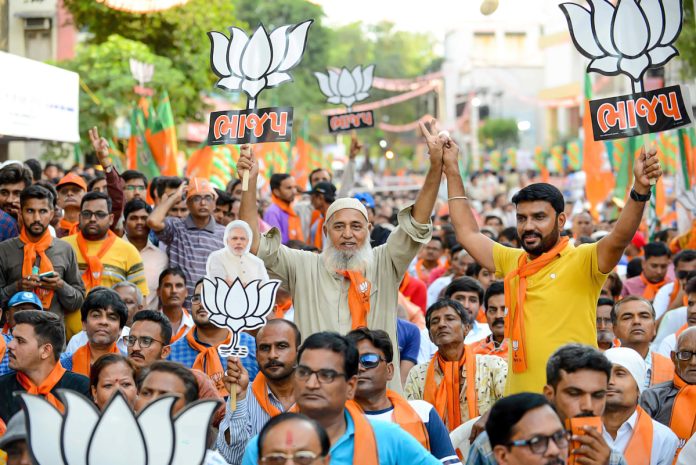Wajeeha Najam
India, with its population of 1.3 billion, boasts a rich tapestry of diversity, encompassing myriad cultures, languages, and religions. Among its populace are approximately 200 million Muslims, constituting a significant demography within the country. However, despite constitutional safeguards apparently guaranteeing equality and protection, India’s Muslims continue to grapple with discrimination, violence, and societal prejudice.
Under the leadership of Prime Minister Narendra Modi and his Bharatiya Janata Party (BJP), Hindu nationalist policies have exacerbated anti-Muslim sentiments, raising concerns both domestically and internationally. Critics contend that Modi’s administration has further marginalized Muslims, curtailed their religious freedoms, and fostered an environment conducive to violence against them. As Modi secured reelection in 2024, apprehensions mount over the deepening religious divisions within India.
The tension between Hindus and Muslims in India goes back to British colonial times and the partition of British India in 1947. The Indian National Congress, led by figures like Mahatma Gandhi and Jawaharlal Nehru, fought for independence, while the All-India Muslim League, led by Muhammad Ali Jinnah, wanted a separate Muslim state. When the borders were hastily drawn, it caused a lot of violence, communal conflicts, and many people had to leave their homes, resulting in a large number of casualties. After partition, around thirty-five million Muslims continued to live in India.
India’s constitution apparently upholds democratic principles, emphasizing social equality and nondiscrimination. Though the term ‘secular’ was incorporated into the preamble in 1976, the constitution falls short of mandating a strict separation of religion and state. Leaders of the Congress party, including Gandhi and Nehru, envisioned an India predicated on equality for all citizens and faiths. Gandhi, a proponent of a unified and inclusive India, tragically fell victim to an assassin’s bullet in 1948, perpetrated by a Hindu nationalist. Nehru, India’s inaugural prime minister, underscored secularism as indispensable for fostering harmony, identifying those seeking to foment religious discord as the nation’s foremost threat.
The genesis of Hindu nationalism can be traced back to colonial-era ideologies advocating for the establishment of India as a Hindu state. Despite the diverse origins of India’s Muslim population, many are perceived with suspicion, often being regarded as alien intruders, despite their historical roots in the country. Political turmoil in the 1980s strained India’s secular fabric, with figures like Indira Gandhi exploiting religious fault lines for political gain. The ascension of the BJP, founded in 1980, to power under Narendra Modi’s stewardship in 2014 marked a pivotal juncture, with the party’s electoral campaigns often imbued with anti-Muslim rhetoric.
Muslims in India face many problems, including employment, education, housing, and political representation. The dominance of the BJP has precipitated a decline in Muslim representation in parliament, with a conspicuous absence of Muslim legislators by mid-2022. Furthermore, pervasive biases within law enforcement agencies hinder justice for Muslim victims, with a significant portion of police officers exhibiting anti-Muslim sentiments. Legislative measures curtailing religious freedoms and extrajudicial actions disproportionately impact Muslims, underscoring grave apprehensions regarding their rights and safety.
The passage of the Citizenship Amendment Act (CAA) in December 2019 elicited widespread condemnation, fast-tracking citizenship for migrants from neighboring countries while conspicuously excluding Muslims. Critics lambasted the legislation as discriminatory, citing its religiously exclusive criteria for citizenship. Additionally, the BJP’s pledge to execute a National Register of Citizens (NRC) stoked fears of rendering Muslims stateless, further exacerbating communal tensions. Modi’s government’s decision to revoke the special autonomy of Jammu and Kashmir in 2019 precipitated a spate of rights abuses, including internet shutdowns and mass arrests, prompting international rebuke.
Recent episodes of communal violence in India have particularly targeted Muslims, increasing concerns regarding their safety and rights. Notable incidents include the destruction of the Babri Masjid in 1992, the Gujarat riots of 2002, and the Muzaffarnagar riots of 2013, among others. Vigilante attacks under the guise of cow protection, clashes over the Citizenship Amendment Act, and hostilities surrounding the inauguration of the Ram Mandir temple in Ayodhya have further exacerbated inter-communal tensions.
Critics accuse BJP officials of downplaying or ignoring violence against Muslims, fostering a climate of insecurity within the community. The proliferation of hate speech and misinformation online has only served to exacerbate violence targeting Muslims, exacerbating existing fault lines within Indian society.
Nevertheless, it’s imperative to recognize that not all Hindus or BJP supporters advocate anti-Muslim sentiments. Many individuals from both communities intensely oppose actions undermining India’s secular ethos. Activists, legal scholars, and conscientious citizens have tirelessly advocated against discriminatory policies and communal violence, demonstrating a commitment to upholding India’s pluralistic fabric.
Internationally, condemnation of India’s treatment of Muslims has been vocal, with foreign governments and international bodies denouncing actions in Kashmir, the Citizenship Amendment Act, and anti-Muslim rhetoric. While Modi’s government has sought to strengthen ties with Muslim-majority nations, criticisms from organizations such as the UN human rights office and the US Commission on International Religious Freedom underscore the gravity of the situation. The relationship between Hindus and Muslims in Modi’s India is complicated and influenced by a mix of history, politics, and societal divisions. As India grapples with its pluralistic identity, the imperative of safeguarding the rights and dignity of all its citizens, regardless of religious affiliation, looms large on the national conscience. Only through concerted efforts to foster inclusivity, tolerance, and mutual respect can India aspire to realize its full potential as a beacon of pluralism and democracy on the global stage.
The author is a Research Officer at Rabita Forum International (RFI).







